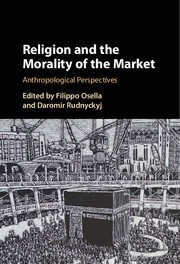Book contents
- Frontmatter
- Dedication
- Contents
- List of Figures
- List of Contributors
- Acknowledgments
- Introduction: Assembling Market and Religious Moralities
- 1 Risk, Fate, Fortune: The Lives and Times of Customs Inspectors in Southern China
- 2 Morality, Markets, and the Gospel of Prosperity
- 3 Religious Myths Retold: Masters and Servants in India's Corporate Culture
- 4 Divine Markets: Ethnographic Notes on Postnationalism and Moral Consumption in India
- 5 Merit Economies in Neoliberal Times: Halal Troubles in Contemporary Sri Lanka
- 6 “Structural Adjustment Islam” and the Religious Economy in Neoliberal Mali
- 7 Assembling Islam and Liberalism: Market Freedom and the Moral Project of Islamic Finance
- 8 Persistent Forms: Catholic Charity Homes and the Limits of Neoliberal Morality
- 9 Marketizing Piety through Charitable Work: Islamic Charities and the Islamization of Middle- Class Families in Indonesia
- 10 “A Poor Muslim Cannot Be a Good Muslim”: Islam, Charitable Giving, and Market Logic in Sri Lanka
- 11 “For God and the Country”: Agricultural Migrations and their Moralities in South India
- 12 “The Globalization of Indifference”: On Pope Francis, Migration and Global Acedia
- Index
- References
10 - “A Poor Muslim Cannot Be a Good Muslim”: Islam, Charitable Giving, and Market Logic in Sri Lanka
Published online by Cambridge University Press: 13 April 2017
- Frontmatter
- Dedication
- Contents
- List of Figures
- List of Contributors
- Acknowledgments
- Introduction: Assembling Market and Religious Moralities
- 1 Risk, Fate, Fortune: The Lives and Times of Customs Inspectors in Southern China
- 2 Morality, Markets, and the Gospel of Prosperity
- 3 Religious Myths Retold: Masters and Servants in India's Corporate Culture
- 4 Divine Markets: Ethnographic Notes on Postnationalism and Moral Consumption in India
- 5 Merit Economies in Neoliberal Times: Halal Troubles in Contemporary Sri Lanka
- 6 “Structural Adjustment Islam” and the Religious Economy in Neoliberal Mali
- 7 Assembling Islam and Liberalism: Market Freedom and the Moral Project of Islamic Finance
- 8 Persistent Forms: Catholic Charity Homes and the Limits of Neoliberal Morality
- 9 Marketizing Piety through Charitable Work: Islamic Charities and the Islamization of Middle- Class Families in Indonesia
- 10 “A Poor Muslim Cannot Be a Good Muslim”: Islam, Charitable Giving, and Market Logic in Sri Lanka
- 11 “For God and the Country”: Agricultural Migrations and their Moralities in South India
- 12 “The Globalization of Indifference”: On Pope Francis, Migration and Global Acedia
- Index
- References
Summary
In an article published in the 1970 Silver Jubilee Souvenir of the Moors’ Islamic Home, H. S. Ismail (1901–1973), a prominent Sri Lankan politician who became the first Muslim Speaker of Parliament, rebuked the Muslim middle class in Colombo for its apparent lack of concern for “social welfare work amongst the Muslims.” Citing a recent newspaper article, he wrote, “Although the big commercial element of the Muslim population is about three per cent of the total…the popular impression of the Muslims is that they are a rich trading community.” The wealthy Muslim elite lives “in luxury and comfort”, wasting vast amounts of money on lavish marriage ceremonies so that “millions of rupees are literally thrown in the drain every year…with absolutely no benefit for the community at large.” While those who live in “luxury and comfort” spend lavishly to keep up their prestige, “the near relatives, the orphans, the needy and the wayfarers get pittances which drag them into the mire of beggary.” The shame of “beggary” is made worse by the way zakat is distributed during Ramadan, “when thousands of Muslims – men, women and children – roam the streets for the collection of their doles. The well-to-do must bear the blame for this sorry exhibition of poverty of our masses and our utter failure to maintain our so-called Islamic brotherhood” (Ismail 1970: 67–69).
That H. S. Ismail encouraged “the well-to-do” to pool resources to provide assistance “for those genuinely in need” should not come as a surprise. An early Tablighi Jamaʾat follower, in 1956 he founded the Ceylon Baithulmal Fund, an organization devoted to the collection and distribution of zakat (obligatory almsgiving) and sadaqa (voluntary charity) “to deserving Muslims in Sri Lanka.” After more than fifty years and moments of instability, today the Fund has a pool of regular donors from whom it collects millions of rupees every year. Donors’ zakat and sadaqa sustain a number of programs for poor Muslims: scholarships and vocational training, contributions to the expenses of marriage ceremonies, assistance to rural communities, acquisition of sewing machines for widows, and financial help for unforeseen life emergencies.
- Type
- Chapter
- Information
- Religion and the Morality of the Market , pp. 217 - 239Publisher: Cambridge University PressPrint publication year: 2017
References
- 4
- Cited by

